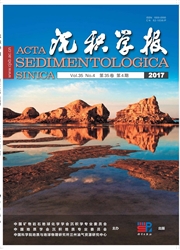

 中文摘要:
中文摘要:
测试了西藏南部岗巴剖面上白垩统宗山组上段地层中厚壳蛤不同壳层的Sr、Mn、Al、Si含量,以及碳、氧、锶同位素组成,测试结果表明:1)厚壳蛤的不同壳层(包括柱状层、珍珠层和二者间的过渡层)的碳酸盐矿物均已新生变形为成岩低镁方解石(DLMC),各种原始碳酸盐矿物(沉积低镁方解石或文石)都已不同程度地发生重结晶;2)从壳的外层(柱状层)向内层(珍珠层)方向,碳酸盐矿物重结晶作用有逐渐增强的趋势,柱状层仍具有很好的柱状结构,其平均阴极发光强度明显弱于内部的珍珠层;3)厚壳蛤不同壳层的Sr含量和δ^18O值都呈现有规律的变化,从靠外部的柱状层到内部的珍珠层,Sr含量和δ^18O值都逐渐降低,同样说明内部的珍珠层丢掉的海水信息相对较多;4)厚壳蛤不同壳层和体腔充填物的δ^18O值都显著低于前人报道的同期海水值,说明在新生变形过程中,厚壳蛤不同壳层和体腔充填物的氧同位素都与大气水或其它成岩流体发生了交换,但柱状层的氧同位素与大气水(或其它成岩流体)的交换相对较少;5)厚壳蛤不同壳层和体腔充填物的锶、碳同位素组成与同期海水值接近,不同壳层之间也没有表现出有规律性的变化,因而在矿物的新生变形过程中,厚壳蛤的锶、碳同位素与成岩流体间的交换相对较少,同时也说明,在氧、碳、锶三种同位素中,氧很容易与成岩流体发生同位交换,向碳、锶同位素则更多地代表了海水信息。
 英文摘要:
英文摘要:
The concentrations of Mn, Sr, SiO2, Al2O3, and values of δ^13C, δ^18O and ^87Sr/^86Sr have been measured for different shell layers of rudist bivalve from a Late Cretaceous section in the south of Tibet. The study resultsare as follows:: 1 ) The constitution minerals, in the pillar, pearl and transition layers for the shell of rudist bivalve have totally transposed to diagenetic low magnesium calcite (DLMC) by neomorphism and all the original carbonates are recrystallized to a certain extent. 2) The recrystallization of inner shell layers (pearl or transition layer) is much stronger than that of outer shell layer. The outer shell layer, with duller catholuminescence, has pillar texture. 3) The concentration of Sr and value of δ^18O displays a regular variety from the outer shell layer (pillar lay- er) to inner shell layer (pearl layer). The concentration of Sr and Value of δ^18O for outer shell layer are lower than those of inner shell layer, suggesting that the inner shell layer lost more information of sea water during neomorphism. 4) The δ^18O values of all the shell layers and the celom filling are much lower than those of original sea water reported by the published papers, so the exchange with meteoric water (or other diagenetic fluid) in oxygen isotope should have happened during neomorphism of precursory minerals in the shell, but relatively less exchange happened in outer shell layer. 5) The carbon and strontium isotope composition of different shell layers is close to the values of coeval sea water, and no regular variation among different shell layers, indicating less exchange with diagenetic fluid in carbon and strontium isotope. The reason is that diagenetic recrystallization of carbonates is accomplished in a system with a low water / rock ratio for carbon (also for strontium), but a high ratio for oxygen, and therefore the isotope compositions of carbon and strontium contains more information for original sea water.
 同期刊论文项目
同期刊论文项目
 同项目期刊论文
同项目期刊论文
 期刊信息
期刊信息
